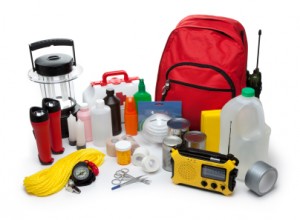There’s a massive trend in the survivalist community that says that buying guns is the most important thing you can possibly do. Unfortunately, Hollywood may have something to do with that reasoning. While prudently arming yourself is important, the most crucial factor of survival is acquiring the basics. If you can’t find water, food, shelter, clothing, and medical supplies, you are not going to do well in a survival situation, no matter how many guns you have.
 The first thing you have to consider is that a gun will not help you in a natural disaster, unless that particular natural disaster has stripped the local community of food and other supplies. It is not until extreme, desperate scenarios that a neighbor will attack another neighbor for resources. In that case, you should already be well prepared for that eventuality. If evacuation is possible, this option should most certainly be exercised, as opposed to barricading yourself in your home.
The first thing you have to consider is that a gun will not help you in a natural disaster, unless that particular natural disaster has stripped the local community of food and other supplies. It is not until extreme, desperate scenarios that a neighbor will attack another neighbor for resources. In that case, you should already be well prepared for that eventuality. If evacuation is possible, this option should most certainly be exercised, as opposed to barricading yourself in your home.
If evacuation is not possible however, knowing how to acquire recourses in the wild will be your best asset for survival. These skills allow you to provide for your basic needs without a single dollar in your wallet. They also allow you to avoid marketplaces, town centers, and major stores if you and your family are on the run.
Clean Water
Water is your most important resource. The human body cannot live more than three days without water, and in certain zones, it is not always easy to find. In northern regions, water is more abundant, but it is more difficult to find farther south. The best thing to do is plan to find water in advance.
Simply sipping from a lake or a river may kill you if you are not careful. Almost all lakes and rivers contain parasites and harmful bacteria that will make you sick. Americans are used to drinking filtered, pure water, which means that our immune systems are not adjusted to combat microorganisms. In a normal scenario, getting sick from lake water simply requires a trip to the doctor’s office, antibiotics, and a few days off from work. In a survival situation, none of those options will be available. You cannot afford to get sick, but if you do, you have to keep acquiring resources and staying mobile. This will be extremely difficult.
The best thing you can do is slowly subject yourself to natural water resources.
- First, you need to make sure that you have a nearby water source, such as a river or lake. Do not begin to drink all of your water from this immediately, as your body is not yet use to it.
- Next, you will need to secure a filtration device. This device depends upon your intentions of a disaster scenario.
- For under $100, you can acquire a quality hiker water filtration system that should last you for 50,000 gallons or so before you need to change the filter.
- If you decide to stay in your home, then it is easy to find gravity-fed water filtration devices that do not require electricity. Simply acquire your water from a nearby stream, and filter it through your home device. Make sure the device you buy is rated to filter out silt, mud, and microorganisms.
- As time goes on, slowly move to unfiltered water, allowing your body to cope over time. It is always important to boil every ounce that you drink. This will add a layer of protection for even unfiltered water.
Finding Food
This section is trickier. Food is never easy to find, and hunting has always been considered a fine skill. Methods of finding food also tend to be based on regions, as animal species differ. While hunting may be a skill you will have to refine and may require additional resources, trapping and fishing will allow you to multitask. There are many devices that you cannot only make from wood and stone, but buying them from sporting goods stores is rather cheap.
Here are several land animal and fish traps you can use:
- Figure Four Deadfall Trap
- Indian Fish Trap
- Snare
- Cage Trap
- Foothold Trap
- Trapping Pit
The beauty of using traps will allow you to set up places where you can catch protein and fat-rich food, without taking your time to procure other basic resources.
Keep in mind that only eating squirrel, rabbit, and even certain deer meet will not provide you with enough necessary fat. Some studies have shown that the human body can actually starve from eating only rodent meat, as it tends to have little to no nutrients and fat. This is another reason to find a water source, because fish is rich in fat and protein. It is easy to build a fish trap, and even using spools with fishing line from overhang branches will allow you to acquire this natural resource with ease.
Also, it is crucial that you buy a book concerning your region’s flora and fauna. Get to know your local edible plants and animals. This will allow you to keep a balanced diet, so that you can collect crucial vitamins and minerals from the local plant life. Even eating only nuts, berries, and natural vegetables, can provide adequate nutrients if you have not been able to catch an animal.
Clothing, Shelter, and Medical Supplies
This segment is not nearly as involved as the first two basics. Clothing, shelter, and medical supplies are not nearly as consumable, which means that you will only have to acquire them every so often.
Luckily, you will probably not have to “bug out” to the Yukon and will remain relatively close to civilization. This means that it may be easy to acquire cloth. Killing animals for their skins may be an option, but again, this will require skill to tan the hide while keeping the furs intact. Simply keeping old clothing, rather than sending them to the thrift store should be enough, as simply layering will keep out the wet and cold. Buying a good coat and hiker clothing is preferable, as they are both light and durable, but this should be a secondary priority.
Shelter is still something that you should only have to build every so often as well. Certain shelters have been known to last for years if they are built properly. Light research will show you how to build a good shelter if you have to stay in the woods for a length of time. However, the best thing you can do is buying a survival hammock, or lightweight “3+ Season” tent. You will most likely not need a “4 Season” tent, as these are rated to climb the Alps and the Himalayas. For temperate zones, “3+ Season” tents should suffice.
Last, it is important to buy a good medical kit. An infected cut could cause a need for amputation if the antibiotics are not present. A good medical kit will allow you to properly clean your wound. This will also have basic gastrointestinal medications in the event that you grow sick from something that you might have eaten. This way, you will not be totally incapacitated, allowing you to keep acquiring resources and keep moving. A proper medical kit should be considered extremely crucial.
If you take medications, find a way to stock up on these. If you cannot, then do research on possible homeopathic or all-natural options. You will be able to buy them over-the-counter, which means that you will be able to stock up and moderately deal with your condition without your prescription medications.
©2012 Off the Grid News
 Off The Grid News Better Ideas For Off The Grid Living
Off The Grid News Better Ideas For Off The Grid Living



